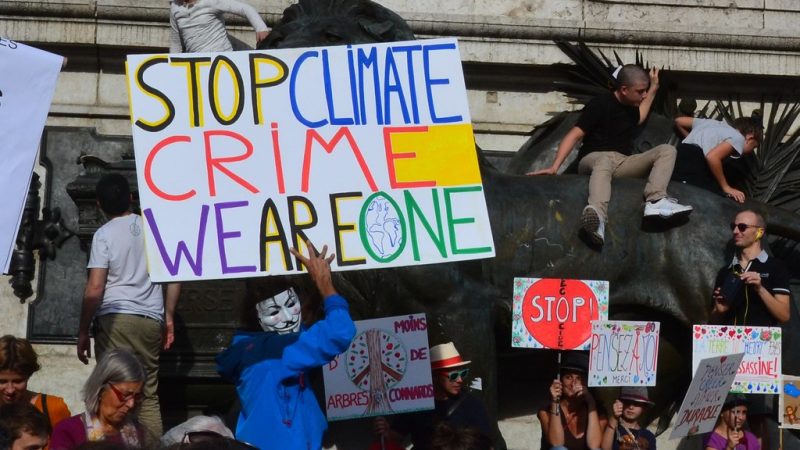The claim “it is too late for 1.5 degrees” is simply wrong

Natalie Bennett is a former leader of the Green Party of England and Wales. She now sits in the House of Lords.
As the second week of the COP27 climate talks begin, there’s not even yet a settled draft of the final communique, and everything to play for. The issue of loss and damage, which I wrote about last week on Green World, remains front and centre, but there are plenty of other issues still to be agreed (or as all too often happens at COPs, quite possibly parked until next time).
One, crucial issue, is whether the target of keeping 1.5 degrees below pre-industrial levels of warming is kept. Many are saying that it is now impossible and should be abandoned.
The 1.5 degrees aim was unexpectedly agreed in Paris in 2015, then as something of a political gesture to the small island nations facing the existential threat of rising seas, but the science has since made it clear that aiming to stay below that level is crucial for all of us. Just look at what the about 1.2 degrees of warming we have now looks like – floods, droughts, heatwaves, storms – and how much we’ve learnt about the damage being done in the polar regions, in the warming oceans.
There are several reasons why 1.5 degrees must not be abandoned. Firstly, it allows people an excuse to push action on climate change further down the timeline. Those who don’t get that there is no economy on a dead planet (or don’t care because they’re only worried about this year’s profits), want to move the goalposts to say ‘until we get to 1.9’, only then to suggest that that target is also “too late now”. The UN Secretary General Antonio Guterres was stressing – among many important points he’s been making as a real champion of climate action – that far too many countries, and companies, are using “net zero” by 2050 as an excuse for inaction, to airily plan actions decades in the future, while continuing on their destructive path today. Abandoning the 1.5 degree target plays right into their hands.
Second, there’s the fact that we now know that many climate impacts get a lot worse, and risk sliding into disastrous feedback loops, over 1.5 degrees. As a sometimes surprising list of major international businesses set out over the weekend, this is “a limit not a target” – even if many other key businesses are guilty of spectacularly failing to live up to their promises.
Finally, there’s the fact that the claim “it is too late for 1.5 degrees” is simply wrong. Just look at what happened around the world when the Covid-19 emergency struck: sudden, monumental change in the way our societies worked. Because it was obvious that had to happen in this emergency. It was a comparison made at the start of COP27 by Mohamed Nasr – in an emergency the world can, and does, change fast. It just has to be capable of recognising that the state of the world’s climate is an emergency (and that there are linked, equally dangerous emergencies in the other ways we are exceeding planetary boundaries). The Russian attack on Ukraine, and particularly the latter’s brave, effective response, has also reminded the world that societies can change fast in the face of existential challenge.
Another big issue for the second week of COP27 is whether the final declaration focuses on the dirty, highest polluting fossil fuels or whether it stresses the need to end dependence on all forms of fossil carbon – the carbon and capture storage that the planet has done for us. This is where the geopolitical games of the summit become evident. One argument says that India is pushing for this to take a focus off its own continued coal use. That’s an argument being made by massive oil producer Saudi Arabia, among others. Putting that together, it suggests the ideal outcome would be a final declaration that acknowledges the extreme damage of coal, whilst also stressing that all new fossil fuel provision is deeply dangerous, risking building in emissions far into the future.
A third key issue for the second week of COP27 is the shift to renewable energy sources being a just transition. This is something that is unlikely to be directly progressed in Sharm el-Sheikh, but NGOs and campaign groups are doing a great job of at least making sure it isn’t forgotten. That means not just ensuring communities now heavily reliant on fossil fuels and its industries are found a prosperous way forward, but protecting communities from abusive mining, and ensuring new renewables are, wherever possible in community hands.
Above all, this is not a time for despair, and that needs to come out of COP27 loud and clear, even if more change-rich messages, for now, are to be found only on the fringes. There are enough resources on this planet for every single human on it to have a decent life, for us to stabilise and eventually repair the natural systems we have trashed. But that demands a very different economic and political model to what we have now. “System change not climate change” is the slogan – ending the summit with “business-as-usual”, as I wrote in today’s Financial Times, will only lead us into disaster.
(Picture credit: Jeanne Menjoulet: Creative Commons)
Left Foot Forward doesn't have the backing of big business or billionaires. We rely on the kind and generous support of ordinary people like you.
You can support hard-hitting journalism that holds the right to account, provides a forum for debate among progressives, and covers the stories the rest of the media ignore. Donate today.



